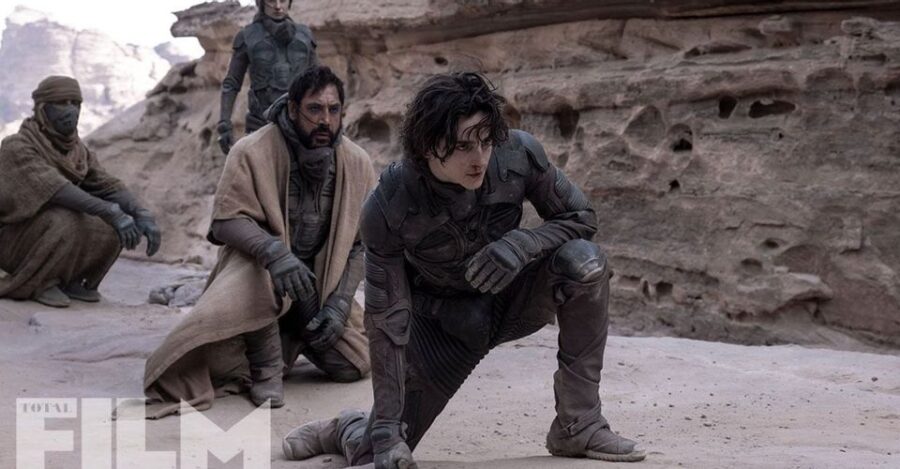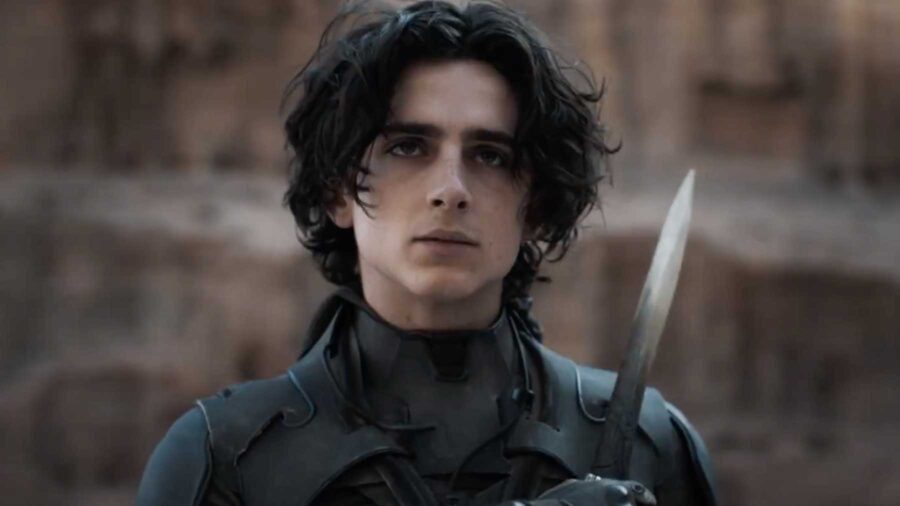Timothée Chalamet Is Breaking His Hero’s Career Advice With Dune
Timothee Chalamet is breaking the advice offered by an early role model. Here's that advice, and how Chalamet is murdering it.
This article is more than 2 years old

Timothée Chalamet is staying clear of superhero movies in accordance with a mentor’s wishes, a Time exclusive reveals, and yet has a strange way of expressing it. The star of Wes Anderson’s The French Dispatch was on the shortlist for the role of Spider-Man/Peter Parker in Captain America: Civil War and previously told Variety he isn’t “averse to those universes” when asked about playing Robin to Robert Pattinson’s Batman in the post-Snyder movies. Check out the very same red carpet interview below:
Despite his previous statements claiming otherwise, Timothée Chalamet went ahead with an October 11 tell-all with Time’s Sam Lansky. When asked about the most helpful pointers he’s ever received, he references an older actor he declines to name. “One of my heroes — I can’t say who or he’d kick my ass — he put his arm around me the first night we met and gave me some advice,” he recalls. “No hard drugs and no superhero movies.” Though Chalamet didn’t specify a timeframe, the meeting presumably took place early into the 25-year-old’s career, long before he became a household name.
And yet, for an actor that has reportedly sworn off superhero films, he certainly has a rather high opinion of the genre. Not only has Timothée Chalamet auditioned for a part against his self-confessed hero’s advice, he has helped fuel fan speculation on his involvement in either the DC Extended or Marvel Cinematic Universe with characteristic fun. He was rumored to play top members of the Bat family — Dick Grayson, Damian Wayne, and Terry McGinnis — on three separate occasions: once for Pattinson’s, another when Ben Affleck was still the DCEU’s Prime Caped Crusader, and a third time now that Michael Keaton is confirmed to play an aged Bruce Wayne (a la Batman Beyond) from The Flash going forward. And he has treated every rumor with lighthearted ease, not the sort of behavior you’d expect from an actor committed to never starring in a superhero movie of his own.
Playing the central character in Denis Villeneuve’s blockbuster adaptation of Frank Herbert’s 1965 science fiction novel Dune isn’t doing Timothée Chalamet any favors either. Though his role in the film is definitely star-turning in the same way Call Me By Your Name established his creative ascendancy in indie features four years earlier, it’s essentially a franchise in the making — a hair’s breadth from qualifying in the same category as a superhero movie-verse. It’s like they say: when you’ve starred in one cinematic universe, you’ve pretty much played it all or are about to. The format is distinctly identical, both capitalizing on a multi-film structure where every entry is made to build on the last and subsequently preempt the next.
Chris Pine was James T. Kirk in Star Trek before he settled into Patty Jenkins’s Wonder Woman as the love of Diana Prince’s life. Oscar Isaac did Star Wars before sinking his teeth into onscreen vigilantism. And Ethan Hawke has been just as critical of superhero movies as Chalamet’s role model, and yet he’s playing Marc Spector’s (Isaac) foil in an upcoming Moon Knight Disney+ series. In similar fashion, Kirsten Dunst likes superhero movies, but has expressed intense dislike for movie universes, and now she may be appearing in Spider-Man: No Way Home alongside Tom Holland and Benedict Cumberbatch. And Timothée Chalamet has already signed up for one too many upcoming franchises. Not too bad for someone who was advised to ignore Hollywood’s ongoing love affair with superhero content.

Dune, conversely known as Dune: Part One, is the first of possibly a trilogy of films. The story itself feels like Joseph Campbell’s The Hero’s Journey — of a promising underdog training to overcome the threat of invasion — and in turn, most superhero movies. Chalamet is basically playing a superhero without necessarily ascribing to the title. More recently, the New York City native is shooting a prequel Willy Wonka movie as the titular confectioner, an installment that may lead to a full-blown franchise. If consistency is any indication, Timothée Chalamet is so obviously into superhero films. Aside from his subtle appreciation for the concept of a cinematic universe, the Little Women star has clearly expressed more than enough interest in playing a superhero in the not-so distant future, never having actively eschewed the medium when inquired or given the opportunity to express his take. Tom Cruise and Jennifer Aniston have, without question; it’s not that difficult if you mean it.
Hollywood’s elitist fanbase (Timothée Chalamet definitely not included) may have the lowest opinion of superhero movies, cluelessly castigating the genre for focusing on mindless fun over arthouse quality, and yet its growing impact on the industry has little equal. Action franchises like James Bond and Mission Impossible have their allure, but their central demographic deviates significantly from a comic book’s. Popular fantasy (or science fiction) young adult IPs like Harry Potter, Star Wars, and Lord of the Rings come close, and yet most of these remain exclusive to niche audiences. Comic book movies, though based on an equally niche source, have since proven attractive to the masses, replacing conventional genres as the most easily accessible stories of the Information Age.
Snooty cinephiles and traditional filmmakers like Martin Scorsese and (ironically) Denis Villeneuve may not like superhero films, but their opinion, in the greater scheme of things, has meant little when paired against the sentiments of the viewers. There’s no longer any denying the facts: superheroes are the new cool and if you’re not in, you will, in time, get left behind. Maybe not Scorsese, but if Oscar winner Chloé Zhao had responded to the call similarly and said no to Eternals, the outcome might have been the same. Timothée Chalamet seems to understand this completely, and is apparently willing to defy his career hero in pursuit of that apex.
Besides, any new genre is frowned upon by those used to the old ways. Classicists reacted similarly when Impressionism became popular, or when Edvard Munch and Pablo Picasso captured the public’s interests in an era when their style was considered sloppy, improper painting. Every newfangled art form is considered a cash grab by those not used to its prevalence. Even manga to this day is laughed at by conventional artists, and yet comic books have already permeated so deeply into the public consciousness, the medium has practically revolutionized storytelling enough to put every conceivable creative expression of tradition out of business. Same goes for streaming. Timothée Chalamet is young; he gets this. Art is art, regardless of how long it’s been in the market or the way it’s disseminated and received by the consumer.

Timothée Chalamet is a clever storyteller with outstanding business acumen; he clearly understands where Hollywood is going and is only waiting for the right project to bite. He may have one heck of a mentor, but in a constantly evolving industry like film and TV, the only thing that matters in the long run is trends. Audiences want new things all the time. Without novelty, sinking into the shadows is inevitable. To his credit, Chalamet never specified in the Time interview if he ever even took his hero’s career advice to heart. The part left unsaid is the twist.












